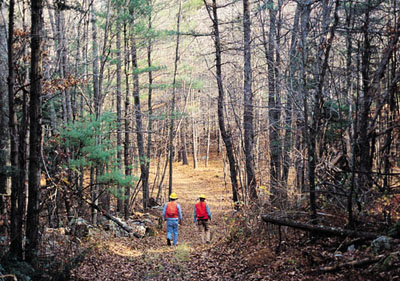In October 2002, President Richard C. Levin and Provost Alison Richard announced the establishment of a $1 million "Yale Green Fund," which will be used over the next three years to support environmental initiatives on campus.
"Raising additional funds for this effort will be an institutional priority," Richard said. "The $1 million will enable us to make a good start."
The "Yale Green Fund" will finance environmental activities proposed by the Provost's Advisory Committee on Environmental Management (ACEM), which was established in the fall of 2001 and includes faculty, staff and undergraduate, graduate and professional school students.
ACEM has proposed a set of environmental principles that have been adopted by the University with the support of the Yale Corporation and the approval of the President and the Provost.
The committee has also identified both long- and short-term projects designed to strengthen, promote and measure the effectiveness of environmental initiatives at the University.
'Green' F&ES Facility
Plans are underway to build a new home for the School of Forestry & Environmental Sciences (F&ES), which would bring the school's entire program into one interconnected complex that provides an inspirational model of environmental and sustainable design.
The linchpin of the complex would be a new "green" facility that would provide adequate and modern space, be a model of energy conservation and efficiency, and employ systems for efficient waste management while restoring the ecology of the surrounding area.
In addition to its plans for a "green" complex, Yale has built a new Environmental Science Center, which was dedicated in the fall of 2002 (see story, page 1). The building represents the first phase of a $1 billion science initiative on campus.
Sustainable Forestry
The University also is taking a leadership role in management of the Yale-Myers Forest, which is operated by F&ES. Yale has been awarded certification by two internationally recognized accrediting agencies after an audit last fall determined that the school's management of the 7,840-acre tract in northeastern Connecticut is exemplary.
The auditors said the Yale-Myers Forest exceeded standards in the protection and management of special sites, in the protection of water quality, and in managing visual impacts of harvesting and other forest operations.
Recycling Initiative
Yale's first efforts in recycling began in 1970 with a group of environmentally conscious undergraduates. In 1991, a formal University-wide recycling program was established. Last year alone, Yale students and staff recycled more than 1,100 tons
of items, including 523 tons of paper,
364 tons of cardboard and 125 tons of cans and bottles.
Contents
Building for State-of-the-Art Research
Inspiring Future Science Leaders
Harnessing the Power of the Genome
Encouraging Women in the Sciences
Forging International Collaborations
Yale Dean Honored With Blue Planet Prize
Engineering the World of Tomorrow
Yale Engineer Receives National Medal of Technology
Promoting the Greening of 'The Blue'
Peabody Museum of Natural History:
Preserving the Past, Educating Future Generations
Bringing Yale Discoveries to The Public
Wright Nuclear Structure Laboratory: Probing the Power of Particles
More Yale Science News
Facilities Far and Near

 SPECIAL
SPECIAL ISSUE
ISSUE 2002-2003
2002-2003 |
| VOLUME 2, NUMBER 1
VOLUME 2, NUMBER 1
